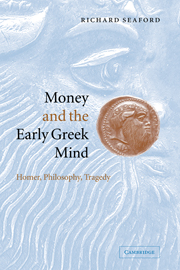Book contents
- Frontmatter
- Contents
- Preface
- List of abbreviations
- 1 Introduction
- PART ONE THE GENESIS OF COINED MONEY
- PART TWO THE MAKING OF METAPHYSICS
- 9 Did politics produce philosophy?
- 10 Anaximander and Xenophanes
- 11 The many and the one
- 12 Heraclitus and Parmenides
- 13 Pythagoreanism and Protagoras
- 14 Individualisation
- 15 Appendix: was money used in the early Near East?
- References
- Index
10 - Anaximander and Xenophanes
Published online by Cambridge University Press: 22 September 2009
- Frontmatter
- Contents
- Preface
- List of abbreviations
- 1 Introduction
- PART ONE THE GENESIS OF COINED MONEY
- PART TWO THE MAKING OF METAPHYSICS
- 9 Did politics produce philosophy?
- 10 Anaximander and Xenophanes
- 11 The many and the one
- 12 Heraclitus and Parmenides
- 13 Pythagoreanism and Protagoras
- 14 Individualisation
- 15 Appendix: was money used in the early Near East?
- References
- Index
Summary
THE FRAGMENT OF ANAXIMANDER
Although Anaximander is largely inaccessible behind later interpretation, this will not seriously impede us, for our focus is on almost the only text which probably contains his own words, preserved via Theophrastus in Simplicius, who says that Anaximander
said that the principle and element of existing things was to apeiron [the unlimited or indefinite], being the first to introduce this name of the principle. He says that it [the principle] is neither water nor any other of the so-called elements, but some other apeiros nature, from which all the heavens and the kosmoi in them come into being. And from which (things) existing things have their genesis, into these [things] also occurs their perishing, according to necessity. For they give penalty and retribution to each other for their injustice according to the disposition/assessment of time, describing it thus in rather poetical terms. It is clear that, having observed the change of the four elements into each other, he did not think fit to make any one of these the substratum, but something else besides these.
The reference to poetical terms suggests that what precedes are the words of Anaximander himself, at least from ‘for they give penalty …’. It also seems unavoidable, in the light of the fragment itself and of other reports about Anaximander, that the things giving the penalty are opposites, notably perhaps the hot and the cold, the dry and the wet.
- Type
- Chapter
- Information
- Money and the Early Greek MindHomer, Philosophy, Tragedy, pp. 190 - 216Publisher: Cambridge University PressPrint publication year: 2004



